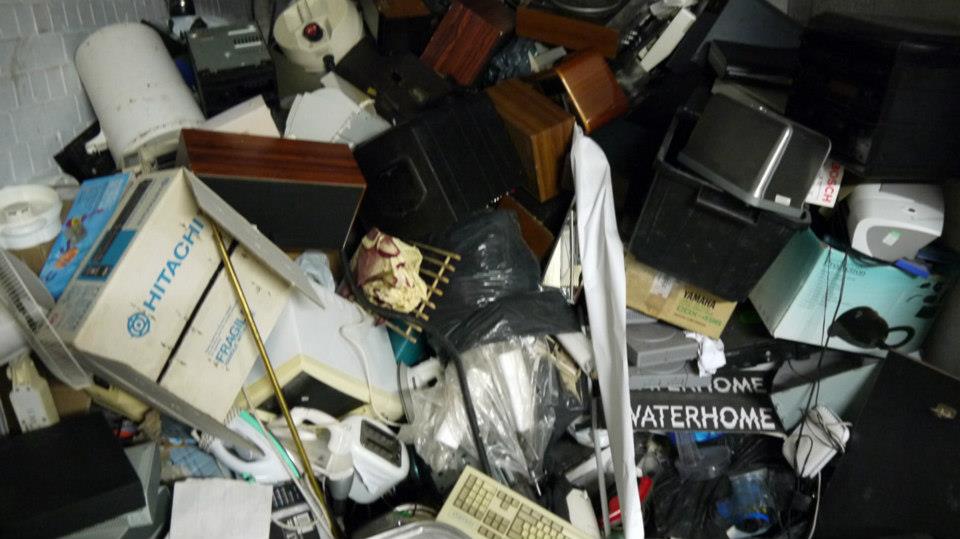Working with Electronic Waste
The first We have a Situation! workshop series exploring the problem of e-waste and the creative potential of digital and online technologies took place in London between 19-22 March 2013 with the networked performative event on Saturday 23 March 2013 at Furtherfield Gallery (2pm GMT/3pm CET). The event was streamed live through the UpStage platform with an online discussion between Furtherfield Gallery and kunstGarten Graz (AT) at the end of the event.
The video below is an edited excerpt from the performance on 23rd March 2013.
WHAS – We have a situation – London (1st version) from Robert de Vaan on Vimeo.
Calling London N4!
We Have A Situation! Electronic waste is getting out of hand !
We need your imagination and skills to… COMPLETELY CHANGE THE WAY WE ALL THINK ABOUT TECHNOLOGY.
LONDON SITUATION e-waste Questionnaire: Tell us what you think here!
ABOUT THE LONDON SITUATION: Working with Electronic Waste
Media artist Tom Keene (Furtherfield) set up the “situation” before the arrival of Helen Varley Jamieson (We Have a Situation! lead artist) and the other project partners. Tom worked with Bright Sparks, a local recycling/fixing/making project, situated in the middle of a housing estate in Islington, not far from where Furtherfield Gallery is located, on researching the topic. Bright Sparks works with local people to re-use, repair and recycle electronics & furniture.
The underlying theme that we explored through the London Situation and that has certainly strong resonance everywhere in Europe as well as worldwide, tackles current issues around the social & economic relationships with material things, and how these alternative counter-economies are evolving alongside the materialistic obsolescence of capitalist consumption. Our research is gathered here.
New EU regulations will soon require member states to collect 45 tonnes of e-waste for every 100 tonnes of electronic goods put on sale during the previous three years, with a target of 4kg of e-waste per person. That’s about 2 million tonnes of e-waste to be collected every year – out of a total of 8 million tonnes generated annually in the EU. Who will be doing this collecting? Who will pay for it? Where and how will the e-waste be recycled? And what happens to the 8 million tonnes not collected for recycling?
Workshop
What will happen?
- Research the issue of e-waste in your local area;
- Experiment with digital technology in live performance: online spaces, web cams, graphics, animations and sounds;
- Collaborate with artists Helen Varley Jamieson and Tom Keene, and Bright Sparks, a local recycling/fixing/making project;
- Learn about online audience interaction and online-offline discussions;
- Develop and present a 20 minute performance about the problem of e-waste.
Who is this for?
- Anyone interested in researching and discussing e-waste
- Anyone interested in the creative potential digital technology
- Anyone open to experimenting and playing
- No prior experience necessary, just an open attitude!
Why should you get involved?
- increased understanding of e-waste issues, and possible solutions;
- new skills and knowledge about digital/online tools for performance;
- creation and presentation of a “cyberformance” – live online event;
- creative exchange with Helen, Tom, Bright Sparks and other workshop participants.
WHERE AND WHEN?
Introductory Event: Sat 16 March 2013, 2-4pm GMT
Workshop Series: Tue 19 – Fri 22 March 2013, 12-6:30pm GMT
Final Networked Performance: Sat 23 March 2013, 2pm GMT
Please contact Alessandra (Furtherfield) for information about times and location.
Ideally participants should be able to take part in the whole process but we welcome anyone who might wish to contribute even just for a few sessions or the final event.
Location
Furtherfield Gallery
McKenzie Pavilion, Finsbury Park
London N4 2NQ
T: +44 (0)20 8802 2827
E: info@furtherfield.org
